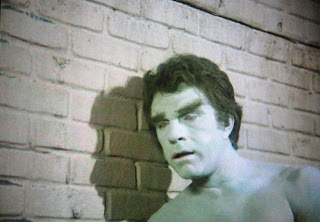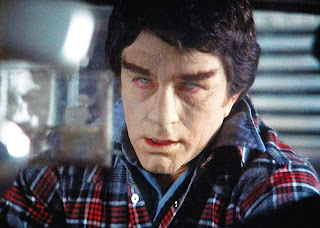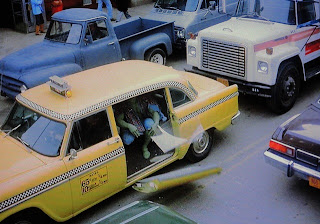"David Banner is believed to be dead and he must let the world think that he is dead until he can find a way to control the raging spirit that dwells within him."
-The Incredible Hulk opening theme as narrated by Ted Cassidy-

New York City is certainly known for many things, not least of which is the October collapse of the 2012 New York Yankees in a four game sweep by the Detroit Tigers. To geek and comic fandom, it is also home to Marvel Comics Group. If memory serves you you'll recall a story I shared in The Incredible Hulk entry Death In The Family regarding a conversation between Marvel's Stan "the man" Lee and The Incredible Hulk TV Series creator Kenneth Johnson. The story pertained to the use of a robot bear versus the wild bear that was eventually utilized for that aforementioned pilot film. Of course the final Hulk blow was to a stuffed bear, but that's irrelevant to ur story. That initial discussion was only part of the story.

As you might remember, Kenneth Johnson indicated Stan Lee loved the script to the second Hulk film but took issue with the Hulk's battle with the grizzly.


For more grizzly bear action I highly recommend director Werner Herzog's remarkable documentary Grizzly Man [2005] and childhood favorite The Life And Times Of Grizzly Adams [1974-1982; now on DVD], that ironically, for a time, ran concurrently with The Incredible Hulk [1977-1982]. Incredible yes, but I digress.
Nevertheless, Lee wanted the Hulk to battle a robot bear. "Well, gee, Stan, I don't think so," said Johnson. Johnson pointed out to Lee that the audience will accept certain conditions and allow only so many "buys." "We were already asking them to believe that Bill Bixby metamorphoses into Lou Ferrigno. That's a big buy. Now, if we add a robot bear, we've gone over the top. We've lost our adult audience, and the show becomes a comic book fantasy."


As we all know and appreciate now, Johnson's The Incredible Hulk was looking to establish a dramatic tone that tapped into certain universal themes that were grounded in reality. His series was a massive success as a result. It was precisely this balance that attracted all ages when it aired and why I loved it then and can still appreciate it today. Johnson indicated the debate between he and Lee continued and Lee even pointed out the obvious facts that Johnson had robots in his own The Bionic Woman [1976-1978]. Johnson responded with logic, "Yes, but that's part of the show's logic." Internal logic on any show and its operating principles needs to be sound. Play within those parameters and a foundation for success will be established for the writers, actors and directors. This why comic books can be so liberating for young people and old. There's a great freedom in comic books that doesn't necessarily translate to film and television. The rules for escape are much broader. Johnson underscored that The Bionic Woman takes place in the "robotic world," but that The Incredible Hulk took place in "the real world." Johnson made every effort to convince Lee that this giant, rampaging Hulk was a huge sell and that's as far as they could take it before the series landed in The Tick [2001-2002] territory and that's not what Johnson was looking to do when he signed on to a superhero property. Johnson had every intention of grounding this super tale in reality and psychology complete with a lead filled with human frailties. It had to be this way or Johnson wouldn't have agreed to it. In fact, Bill Bixby would have walked too. Eventually, Lee and Johnson terminated their phone conversation and Johnson never had a good feeling on how that discussion ended.

Weeks later and we arrive at The Incredible Hulk, Season One, Episode 6, Terror In Times Square. Filming in New York City for the episode, Johnson knew some aspects of his conversation with the man who created the character that is The Hulk were still very much unresolved. Johnson, of course, won the debate as we know, but Johnson never felt comfortable with the conclusion of that call. During filming of Terror In Times Square, Johnson decided to pay a little visit to Lee at his office in Manhattan. Lee was fairly excited to see Johnson that day and Johnson was taken aback by the reaction. Lee exclaimed, "I just sent you a letter! I wrote that you were right and I was wrong!" Relieved Johnson was pleased to see Lee understood what he was trying to achieve for the series. "He understood that I needed to bend the story from the comic book to television in order to give it that sense of reality."



So with its incredibly over the top comic book-styled title and the colorful good fun of Terror In Times Square we return to the journey of one incredibly grounded Dr. David Banner thanks to the visionary that was Kenneth Johnson.
And Banner continues to let the world think that he is dead until he can control that dark spirit within him, always the beauty of this Jekyll and Hyde character-based drama in the spirit of Robert Louis Stevenson's Strange Case Of Dr. Jekyll And Mr. Hyde [1886]. Banner's alter-ego is merely a part of who Banner is and the series approaches the humanity of the story from this angle and less that of a superhero tale.

We find David [Blake] has established a comfortable relationship as an arcade worker in New York City's Times Square and caught the attention of the owner's daughter, Caroll, with his intellect. My, Bill Bixby does have a way with the ladies. As always, despite the pursuit of reporter Jack McGee, also in New York City, David remains evasive about his past and who he really is or was. By the way, do you remember arcades? They were a dime a dozen in the 1970s and I gleefully spent a good bit of coin in those places after school. I miss them. They were always a swirl of noise and fun lights. I know they are still out there to a degree, but with the advent of home gaming systems those days are over.



David and Caroll unknowingly deliver a cut of the arcade's profits to the local crime boss, Jason Lair, for her father, as a form of protection fee. The local businesses unite and have decide to give the crime boss 10%, rather than 40%, of their cut. This, of course, never sits well with the Cosa Nostra or mafia in New York, particularly in the 1970s.
Loyalty, as you know, is one of the core operating principles within the families. Lair wants one of the local businessmen killed and to do it commissions Caroll's father, Norman, to do the dirty work to prove his loyalty and perhaps spare his own life. David Blake attempts to warn Leo of the hit.


It's not long before the mystery of David catches up with him and Bill Bixby always handles these moments beautifully and with real sincerity. He's truly affecting in his moments to shine within the series even up against soldiers of a capo regime.
You'd think David might become overconfident in handling sticky situations knowing his alter-ego is never far behind should he be roused to anger. But, Bixby plays the Banner character beautifully as a man who is intellectual, a man whose thought processes are based in science, reason and logic. He is resistant to uncontrolled emotional responses and is very much the antithesis of everything the Hulk represents making the dichotomy within him all that more pronounced and potent as a modern day Jekyll and Hyde tale. David Banner's nature is to avoid conflict, which makes the reality of his situation all the more ironic and startling. Banner doesn't fully understand his situation, but respects this uncontainable strength. He recognizes the genie in the bottle should stay there and is true to who he is as David Banner.

Banner makes a break from Lair's henchmen or soldiers and escapes into a city alley way after transforming into the Hulk and handling the mafia quickly and effectively. He transforms back to Banner and the episode spends a few moments on that transformation that are extremely well-crafted.
David returns to Norman's apartment to find Norman and Leo have fallen asleep after being intoxicated with liquor and David knows Norman has missed his scheduled appointment with Lair.
David obtains evidence from Lair's lair. Meanwhile, Leo and Norman awaken from their drunken stupors and plan to take Jason with them understanding that they are both by all accounts dead men walking. It's near impossible to leave the circle alive.


David delivers the evidence to Caroll for protection and tells her to contact law enforcement. David makes his way to save Leo and Norman ultimately becoming the Terror in Times Square. Through frustration with New York City traffic and who hasn't been frustrated with city traffic, David loses it and becomes the raging, rampaging Hulk. And so the rampage through Times Square commences in an almost mighty Marvel manner! The Boy Wonder cleverly notices that Lou Ferrigno is wearing green sneakers through the city on his quest. It's a small detail, but the make-up department has done a remarkably good job of disguising it. Somewhat remarkably, some way, somehow the Hulk manages retain enough logic to reach Norman and Leo in time. How does a raging thing like the Hulk pull that off? This is clearly a buy and something we are expected to overlook or accept. I have no idea why the impossible was allowed, but it does seem to defy the logic of the illogical. Still, this was the 1970s.


The TERROR IN TIMES SQUARE sequence: Actor Bill Bixby recalled the scene when Lou Ferrigno, as the Hulk, broke out of a cab and literally ran down the streets of Times Square. "He was really in New York, in 40 degree weather, running half-naked right down the middle of Broadway! And I'll give you a true story about the reactions of the people to the fact that he was really there.... The police department got a call from a lady who said, 'I have just been attacked by the Hulk.' She didn't say it was a man in green, right? She said, 'The Hulk.' They said, 'What do you mean, lady?' She said, 'The Hulk stopped in front of me, looked at me, growled menacingly,'." Bixby added, "Lou Ferrigno tried to calm her down by reaching out to her to let her know it was okay--but her last accusation was, 'He got green on my fur coat - and then he ran away!' The police department actually got that call. People were chasing him down the street, screaming 'It's the Hulk, it's the Hulk! And they were not afraid of him and they loved him" [The Hulk #10 magazine, p.30].







Of course all ends well and perhaps a little too tidy as the Hulk miraculously saves the day with an astounding and real sense of mission apparently not forgotten following David's transformation into the Hulk. Incredibly the Hulk is able to conveniently convey a significant ethical and moral message to the kids at home. While, The Incredible Hulk certainly worked on a more mature level emotionally, the under riding messages are driven home for children as the Hulk is clearly presented as ultimately righteous, a force of good, in Terror In Times Square. Even Bill Bixby's character leaves money on a clothes line when he essentially steals/takes a pair of clothes. Do you know where those clothes were purchased David? This is New York my friend and clothes are much more expensive than you think. It's rare to see such a kind act of faith and honesty, but it still exists and Banner was there in the 1970s as a proper moral compass for youthful eyes.

Terror In Times Square is reasonably solid before reaching its predictable and somewhat illogical [as far as the Hulk's behavior] resolution. Performances and the brief character moments for David Banner are the highlights of course. Still, the location shots discussed earlier really are done remarkably well for the day.
"Oh, here comes the sad music," says the Boy Wonder as Hulk says goodbye to Carroll with a kiss. She's definitely the most attractive babe David has had the pleasure of bidding farewell to in Season One. I'm not sure I'd give up that arcade job just yet. Asteroids or Space Invaders in need of repair?


Terror In Times Square: B+
NEXT ISSUE: 747 - The first of three scripts for The Incredible Hulk by none other than the son of legendary writer Richard Matheson co-scripting with Thomas Szollosi. Should we expect something slightly out of the ordinary for The Incredible Hulk or will it be subject to the parameters of those pre-determined 1970s expectations often attributed to the period? Stay tuned true believers. Excelsior!
No comments:
Post a Comment